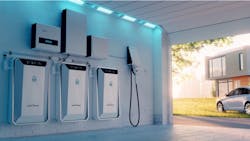UL Solutions Debuts New Testing Protocol for Residential Battery Energy Storage Systems
UL Solutions recently announced a new testing protocol that addresses fire service organizations’ demand for enhanced evaluations of battery energy storage systems for residential use.
Commonly paired with rooftop solar installations and, in some cases, wind turbines, residential battery energy storage systems (BESS) allow homeowners to store excess solar or wind power for use anytime, even when the sun isn’t shining or the wind isn’t blowing. A residential BESS can protect users from power outages and grid fluctuations that could impact the energy supply. A BESS can also offer cost savings by allowing users to harness the energy already generated and stored.
Battery storage is an essential enabler of the energy transition, and residential battery storage is a crucial part of it. Rising energy prices, increased blackout risk and government incentives drive interest in residential energy storage systems. The market for residential BESS is expected to see significant growth, with an estimated value of $898 million (USD) in 2023 and a projected reach of more than $2 billion by 20281.
The recently published UL 9540B Outline of Investigation for Large-Scale Fire Test for Residential Battery Energy Storage Systems includes a testing protocol with a robust ignition scenario and enhanced acceptance criteria for BESS in residential settings. The latest test method addresses the fire propagation behavior of a BESS if a thermal runaway propagation event leading to an internal fire were to occur during the system’s lifetime.
Since battery energy storage systems were first deployed a decade ago, UL Solutions has been at the forefront of addressing the associated fire safety concerns by working with fire protection and battery experts, original equipment manufacturers, code authorities, and other key stakeholders to enhance the test methods for evaluating thermal runaway fire propagation in BESS. UL 9540, the Standard for Energy Storage Systems and Equipment, and UL 9540A, the Standard for Test Method for Evaluating Thermal Runaway Fire Propagation in Battery Energy Storage Systems, were developed to address the safety of and evaluate thermal runaway propagation behavior in energy storage systems. UL 9540B evaluates the fire propagation behavior of residential BESS and works in concert with UL 9540 and UL 9540A to provide a holistic approach to safety and fire behavior.
UL 9540B testing is not intended to be used in lieu of UL 9540A fire propagation testing to determine compliance with BESS installation codes and standards such as the IFC and NFPA 855. Instead, this test sequence can generate large-scale fire data for fire officials to assist them in evaluating residential BESS installations.
